I have always been fascinated by Lord Byron. He is one of the greatest British poets who captures our attention. His poems delve deep into the mind and soul with a critical skepticism. He waged a battle against social norms to be fully free in all aspects of life, love, and thought. A libertine rebel who was exiled from England. A charismatic, complex personality, and tragic figure. He was larger than life and lived it to the hilt.
Baron George Gordon Byron (1788-1824), aristocrat, poet, playwright, icon, social reformer, adventurer, spy, war hero, and member of the British House of Lords. He was famous for his Don Juan and Childe Harold’s Pilgrimage epic poems.
It is unclear how much of his public persona is true or myth. For publicity, Byron created his public persona to sell poetry to his adoring British female fans.
Bad Boy libertine icon, he was scandalized, disfavored by the Crown, socially outcast for his ‘incestuous’ affair with his half-sister and other affairs, and his notorious lifestyle. This greatly increased the sales of his poetry which may have been partly created for publicity. Exiled, he lived in Switzerland and Italy in Venice, Ravenna, Pisa, and Genoa. His friendship with Percy and Mary Shelley in Switzerland and Italy is legendary.
His poetry has been set to music by Beethoven, Schubert, Rossini, Mendelssohn, Schumann, and Berlioz.
Byron’s exile may have been partly a cover for clandestine operations. Research has indicated that Byron was a spy deployed to further British foreign policy to break-up the Holy Alliance of Austria, Russia, and Prussia in-order to position British interests in the strategic Balkan region. This policy was also to break-up the Ottoman Empire. Byron worked to further the Greek War of Independence and in Armenia against the Ottoman Empire. To this day he is revered as a folk hero in Greece. (Cochran, Brewer).
Further, Byron had an affair with Countess Teresa Guiccioli who got him membership in a secret Venetian Masonic order run by her father Count Ruggerio Gamba working to unite Italy against Austrian control.
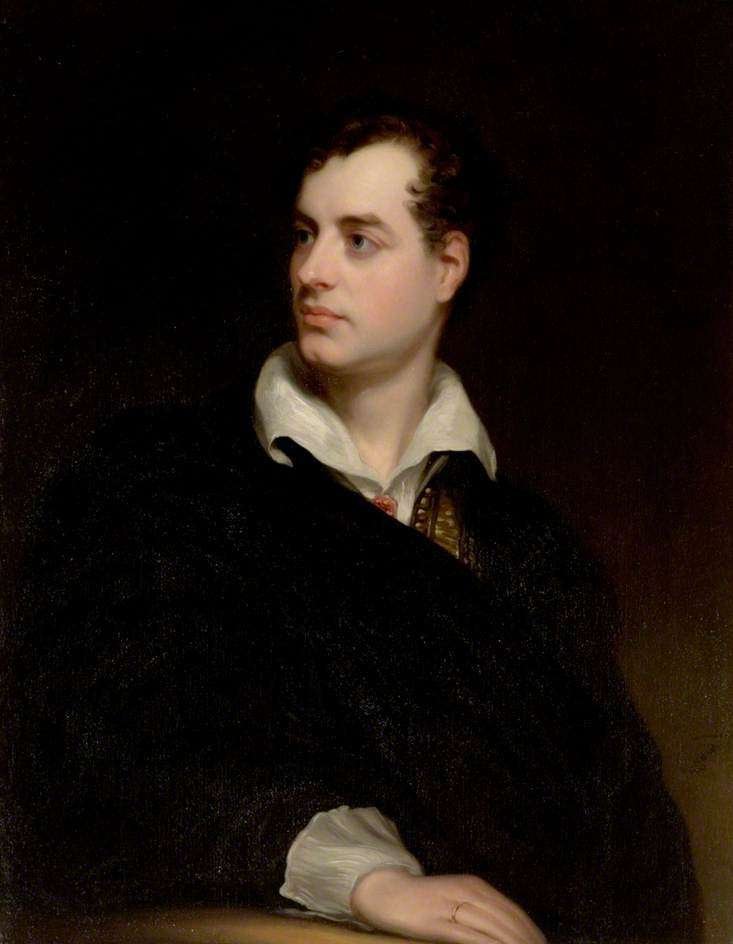
Lord Byron Quotes on Life
“All who joy would win must share it. Happiness was born a Twin.”
“Sorrow is knowledge, those that know the most must mourn the deepest, the tree of knowledge is not the tree of life.”
“There are four questions of value in life. What is sacred? Of what is the spirit made? What is worth living for? What is worth dying for? The answer to each is the same, only love.”
“Love will find a way through paths where wolves fear to prey.”
“Always laugh when you can. It is cheap medicine.”
“Adversity is the first path to truth.”
“The heart will break, but broken live on.”
“Yes, love indeed is light from heaven; A spark of that immortal fire with angels shared, by God given to lift from earth our low desire.”
“Man, being reasonable, must get drunk; the best of life is but intoxication.”
“Those who will not reason, are bigots, those who cannot, are fools, and those who dare not, are slaves.”
“For truth is always strange; stranger than fiction.”
“The best prophet of the future is the past.”
“There is something pagan in me that I cannot shake off. In short, I deny nothing, but doubt everything.”
“Opinions are made to be changed – or how is truth to be got at?”

Byronic Hero
Byron was the quintessential “Bad Boy” anti-hero, or at least that is what he portrayed as his public persona. He developed a literary model, “The Byronic Hero” – an archetype of the extreme Romantic hero.
Critic Lord Macaulay described the Byronic Hero as: “A man [or woman] proud, moody, cynical, with defiance on his brow, and misery in his heart, a scorner of his kind except women, implacable in revenge, yet capable of deep and strong affection.”
Other character traits include:
- Bad Boy or Dark Lady
- Sexually liberated
- Dark, brilliant, complex, perceptive, mysterious
- Charismatic, larger than life, attractive, appealing, inspires others
- Rejects social norms and conventions
- Self-centered, solitary
- Alienated, cynical, flawed, self-destructive
- Wounded, tortured, secret, moody, brooding
Other writers have adopted the Byronic Hero character trait in their own writing, including Goethe’s Faust, Mary Shelley’s Victor Frankenstein, Poe, Hawthorne’s Scarlet Letter, Melville’s Ahab in Moby Dick, Dumas’ Dante in The Count of Monte Cristo, Emily Bronte’s Heathcliff in Wuthering Heights, Charlotte Bronte’s Rochester in Jane Eyre, Hugo’s Frollo in The Hunchback of Notre Dame, Pushkin’s Eugene Onegin, Dickens’ Steerforth in David Copperfield, Jules Verne’s Captain Nemo, Wilde’s Dorian Gray, Shaw’s Don Juan, Leuroux’s Phantom of the Opera, Bram Stoker’s Dracula, Rhett Butler in Gone With the Wind, Ian Flemings’ James Bond, F. Scott Fitzgeralds’ Gatsby, Salinger’s Holden Caufield, du Maurier’s Maxin in Rebecca, James Joyce’s Stephen Dedalus, Anne Rice’s Lestat, and others.
Several celebrities have modeled their public image with the Byronic Hero persona, such as Elvis, Mick Jagger, David Bowie, Madonna, Marlon Brando, James Dean, Marilyn Monroe, John Lennon, Robert Downey, Jr., Johnny Depp, and others.
Lord Byron character in Film and TV:
- Bride of Frankenstein, 1935, Byron played by Gavin Gordon
- Lady Caroline Lamb, 1972, Byron played by Richard Chamberlain
- Gothic, 1986, Byron played by Gabriel Byrne
- Rowing In the Wind, 1988, Byron played by Hugh Grant
- Haunted Summer, 1988, Byron played by Philip Anglin
- Frankenstein Unbound, 1990, Byron played by Jason Patric
- Highlander TV episode, 1997, Byron played by Jonathan Firth
- Byron, 2003, Byron played by Jonny Lee Miller
- Beau Brummel: This Charming Man, 2006, Byron played by Matthew Rhys
- Mary Shelley, 2017, Byron played by Tom Sturridge
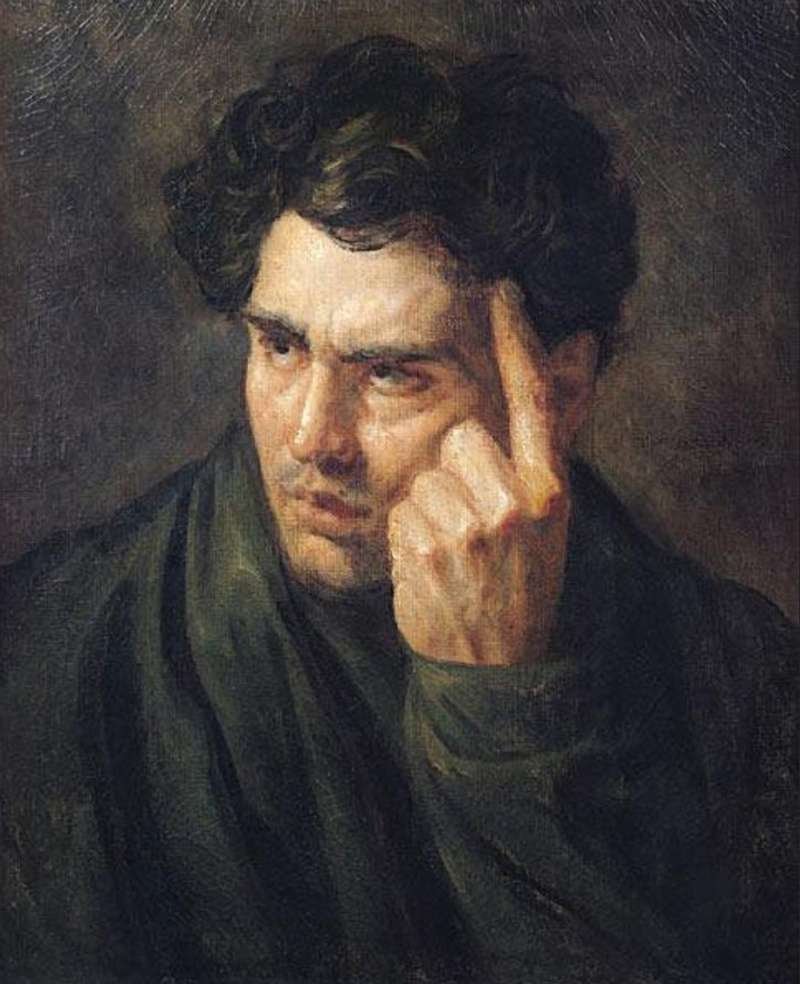
It Is the Hour
It is the hour when from the boughs
The nightingale’s high note is heard;
It is the hour — when lover’s vows
Seem sweet in every whisper’d word;
And gentle winds and waters near,
Make music to the lonely ear.
Each flower the dews have lightly wet,
And in the sky the stars are met,
And on the wave is deeper blue,
And on the leaf a browner hue,
And in the Heaven that clear obscure
So softly dark, and darkly pure,
That follows the decline of day
As twilight melts beneath the moon away.
She Walks In Beauty
She walks in beauty, like the night
Of cloudless climes and starry skies;
And all that’s best of dark and bright
Meet in her aspect and her eyes;
Thus mellowed to that tender light
Which heaven to gaudy day denies.
One shade the more, one ray the less,
Had half impaired the nameless grace
Which waves in every raven tress,
Or softly lightens o’er her face;
Where thoughts serenely sweet express,
How pure, how dear their dwelling-place.
And on that cheek, and o’er that brow,
So soft, so calm, yet eloquent,
The smiles that win, the tints that glow,
But tell of days in goodness spent,
A mind at peace with all below,
A heart whose love is innocent!
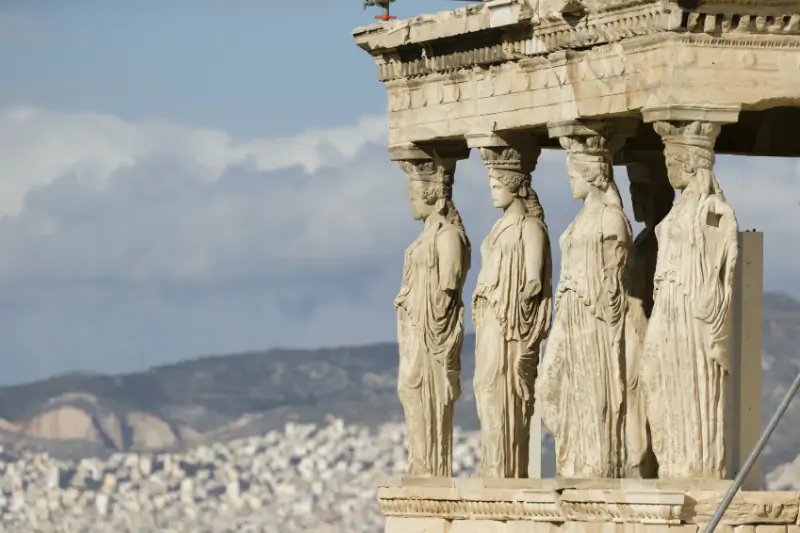
The Isles of Greece
The isles of Greece, the isles of Greece!
Where burning Sappho loved and sung,
Where grew the arts of war and peace,
Where Delos rose, and Phoebus
sprung!
Eternal summer gilds them yet,
But all, except their sun, is set…
The mountains look on Marathon–
And Marathon looks on the sea;
And musing there an hour alone,
I dreamed that Greece might still be free;
For standing on the Persians’ grave,
I could not deem myself a slave.
A king sat on the rocky brow
Which looks o’er sea-born Salamis;
And ships, by thousands, lay below,
And men in nations–all were his!
He counted them at break of day–
And when the sun set, where were they?
And where are they? And where art thou?
My country? On thy voiceless shore
The heroic lay is tuneless now–
The heroic bosom beats no more!
And must thy lyre, so long divine,
Degenerate into hands like mine?
‘Tis something, in the dearth of fame,
Though linked among a fettered race,
To feel at least a patriot’s shame,
Even as I sing, suffuse my face;
For what is left the poet here?
For Greeks a blush–for Greece a tear….
Fill high the bowl with Samian wine!
Our virgins dance beneath the shade–
I see their glorious black eyes shine;
But gazing on each glowing maid,
My own the burning teardrop laves,
To think such breasts must suckle slaves.
Place me on Sunium’s marbled steep,
Where nothing, save the waves and I,
May hear our mutual murmurs sweep;
There, swanlike, let me sing and die:
A land of slaves shall ne’er be mine–
Dash down yon cup of Samian wine!
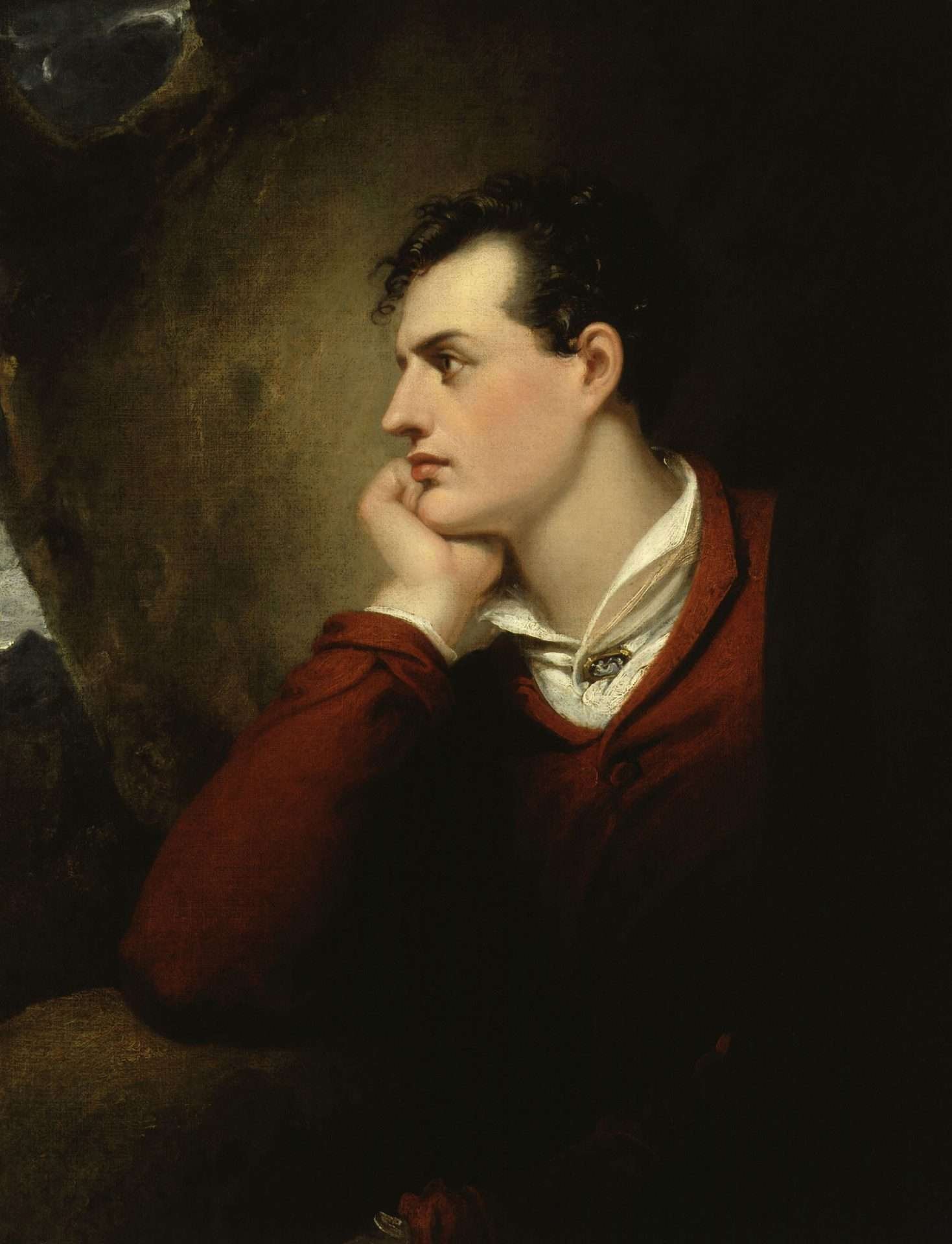
When We Two Parted
When we two parted
In silence and tears,
Half broken-hearted
To sever for years,
Pale grew thy cheek and cold,
Colder thy kiss;
Truly that hour foretold
Sorrow to this.
The dew of the morning
Sunk chill on my brow—
It felt like the warning
Of what I feel now.
Thy vows are all broken,
And light is thy fame;
I hear thy name spoken,
And share in its shame.
They name thee before me,
A knell to mine ear;
A shudder comes o’er me—
Why wert thou so dear?
They know not I knew thee,
Who knew thee too well—
Long, long shall I rue thee,
Too deeply to tell.
In secret we met—
In silence I grieve,
That thy heart could forget,
Thy spirit deceive.
If I should meet thee
After long years,
How should I greet thee?—
With silence and tears.
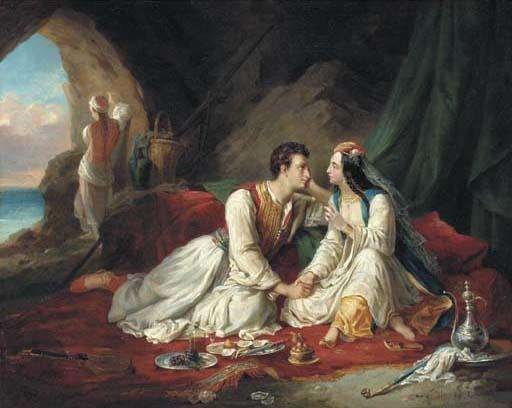
Don Juan, excerpt
Oh, Love! what is it in this world of ours
Which makes it fatal to be loved? Ah, why
With cypress branches hast thou wreathed thy bowers,
And made thy best interpreter a sigh?
As those who dote on odours pluck the flowers,
And place them on their breast—but place to die—
Thus the frail beings we would fondly cherish
Are laid within our bosoms but to perish.
So We’ll Go No More a-Roving
So we’ll go no more a-roving
So late into the night,
Though the heart still be as loving,
And the moon still be as bright.
For the sword outwears its sheath,
And the soul outwears the breast,
And the heart must pause to breathe,
And love itself have rest.
Though the night was made for loving,
And the day returns too soon,
Yet we’ll go no more a-roving
By the light of the moon.
Childe Harold Pilgrimage, excerpt
There is a pleasure in the pathless woods,
There is a rapture on the lonely shore,
There is society, where none intrudes,
By the deep Sea, and music in its roar:
I love not Man the less, but Nature more,
From these our interviews, in which I steal
From all I may be, or have been before,
To mingle with the Universe, and feel
What I can ne’er express, yet cannot all conceal.
There’s Not A Joy The World Can Give
There’s not a joy the world can give like that it takes away
When the glow of early thought declines in feeling’s dull decay;
‘Tis not on youth’s smooth cheek the blush alone, which fades so fast,
But the tender bloom of heart is gone, ere youth itself be past.
Then the few whose spirits float above the wreck of happiness
Are driven o’er the shoals of guilt, or ocean of excess:
The magnet of their course is gone, or only points in vain
The shore to which their shivered sail shall never stretch again.
Then the mortal coldness of the soul like death itself comes down;
It cannot feel for others’ woes, it dare not dream its own;
That heavy chill has frozen o’er the fountain of our tears,
And though the eye may sparkle still, ’tis where the ice appears.
Though wit may flash from fluent lips, and mirth distract the breast,
Through midnight hours that yield no more their former hope of rest,
‘Tis but as ivy-leaves around the ruined turret wreath—
All green and wildly fresh without, but worn and grey beneath.
Oh, could I feel as I have felt, or be what I have been,
Or weep as I could once have wept, o’er many a vanished scene;
As springs in deserts found seem sweet, all brackish though they be,
So, midst the withered waste of life, those tears would flow to me.
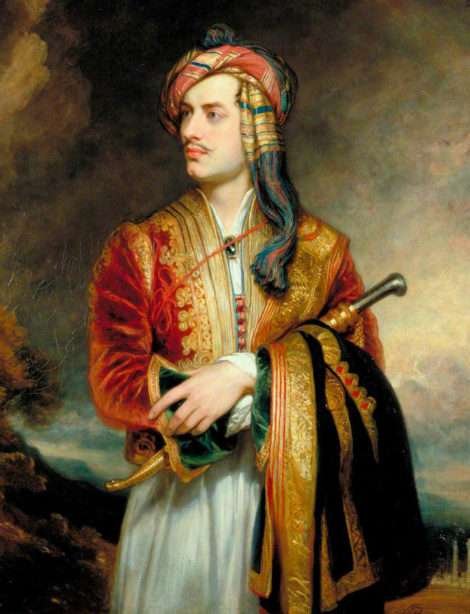
And Thou Art Dead, As Young and Fair
And thou art dead, as young and fair
As aught of mortal birth;
And form so soft, and charms so rare,
Too soon return’d to Earth!
Though Earth receiv’d them in her bed,
And o’er the spot the crowd may tread
In carelessness or mirth,
There is an eye which could not brook
A moment on that grave to look.
I will not ask where thou liest low,
Nor gaze upon the spot;
There flowers or weeds at will may grow,
So I behold them not:
It is enough for me to prove
That what I lov’d, and long must love,
Like common earth can rot;
To me there needs no stone to tell,
‘T is Nothing that I lov’d so well.
Yet did I love thee to the last
As fervently as thou,
Who didst not change through all the past,
And canst not alter now.
The love where Death has set his seal,
Nor age can chill, nor rival steal,
Nor falsehood disavow:
And, what were worse, thou canst not see
Or wrong, or change, or fault in me.
The better days of life were ours;
The worst can be but mine:
The sun that cheers, the storm that lowers,
Shall never more be thine.
The silence of that dreamless sleep
I envy now too much to weep;
Nor need I to repine
That all those charms have pass’d away,
I might have watch’d through long decay.
The flower in ripen’d bloom unmatch’d
Must fall the earliest prey;
Though by no hand untimely snatch’d,
The leaves must drop away:
And yet it were a greater grief
To watch it withering, leaf by leaf,
Than see it pluck’d to-day;
Since earthly eye but ill can bear
To trace the change to foul from fair.
I know not if I could have borne
To see thy beauties fade;
The night that follow’d such a morn
Had worn a deeper shade:
Thy day without a cloud hath pass’d,
And thou wert lovely to the last,
Extinguish’d, not decay’d;
As stars that shoot along the sky
Shine brightest as they fall from high.
As once I wept, if I could weep,
My tears might well be shed,
To think I was not near to keep
One vigil o’er thy bed;
To gaze, how fondly! on thy face,
To fold thee in a faint embrace,
Uphold thy drooping head;
And show that love, however vain,
Nor thou nor I can feel again.
Yet how much less it were to gain,
Though thou hast left me free,
The loveliest things that still remain,
Than thus remember thee!
The all of thine that cannot die
Through dark and dread Eternity
Returns again to me,
And more thy buried love endears
Than aught except its living years.
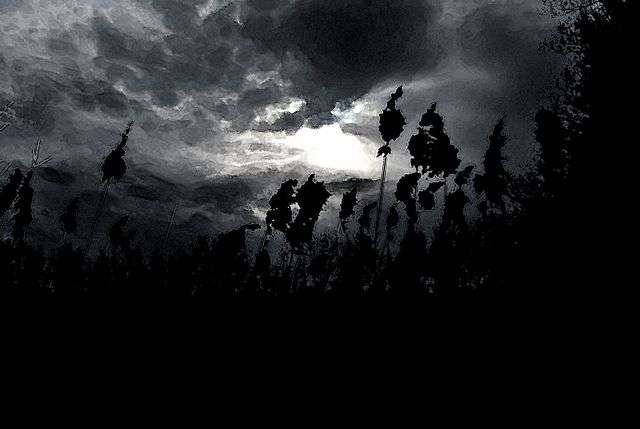
Darkness
I had a dream, which was not all a dream.
The bright sun was extinguish’d, and the stars
Did wander darkling in the eternal space,
Rayless, and pathless, and the icy earth
Swung blind and blackening in the moonless air;
Morn came and went—and came, and brought no day,
And men forgot their passions in the dread
Of this their desolation; and all hearts
Were chill’d into a selfish prayer for light:
And they did live by watchfires—and the thrones,
The palaces of crowned kings—the huts,
The habitations of all things which dwell,
Were burnt for beacons; cities were consum’d,
And men were gather’d round their blazing homes
To look once more into each other’s face;
Happy were those who dwelt within the eye
Of the volcanos, and their mountain-torch:
A fearful hope was all the world contain’d;
Forests were set on fire—but hour by hour
They fell and faded—and the crackling trunks
Extinguish’d with a crash—and all was black.
The brows of men by the despairing light
Wore an unearthly aspect, as by fits
The flashes fell upon them; some lay down
And hid their eyes and wept; and some did rest
Their chins upon their clenched hands, and smil’d;
And others hurried to and fro, and fed
Their funeral piles with fuel, and look’d up
With mad disquietude on the dull sky,
The pall of a past world; and then again
With curses cast them down upon the dust,
And gnash’d their teeth and howl’d: the wild birds shriek’d
And, terrified, did flutter on the ground,
And flap their useless wings; the wildest brutes
Came tame and tremulous; and vipers crawl’d
And twin’d themselves among the multitude,
Hissing, but stingless—they were slain for food.
And War, which for a moment was no more,
Did glut himself again: a meal was bought
With blood, and each sate sullenly apart
Gorging himself in gloom: no love was left;
All earth was but one thought—and that was death
Immediate and inglorious; and the pang
Of famine fed upon all entrails—men
Died, and their bones were tombless as their flesh;
The meagre by the meagre were devour’d,
Even dogs assail’d their masters, all save one,
And he was faithful to a corse, and kept
The birds and beasts and famish’d men at bay,
Till hunger clung them, or the dropping dead
Lur’d their lank jaws; himself sought out no food,
But with a piteous and perpetual moan,
And a quick desolate cry, licking the hand
Which answer’d not with a caress—he died.
The crowd was famish’d by degrees; but two
Of an enormous city did survive,
And they were enemies: they met beside
The dying embers of an altar-place
Where had been heap’d a mass of holy things
For an unholy usage; they rak’d up,
And shivering scrap’d with their cold skeleton hands
The feeble ashes, and their feeble breath
Blew for a little life, and made a flame
Which was a mockery; then they lifted up
Their eyes as it grew lighter, and beheld
Each other’s aspects—saw, and shriek’d, and died—
Even of their mutual hideousness they died,
Unknowing who he was upon whose brow
Famine had written Fiend. The world was void,
The populous and the powerful was a lump,
Seasonless, herbless, treeless, manless, lifeless—
A lump of death—a chaos of hard clay.
The rivers, lakes and ocean all stood still,
And nothing stirr’d within their silent depths;
Ships sailorless lay rotting on the sea,
And their masts fell down piecemeal: as they dropp’d
They slept on the abyss without a surge—
The waves were dead; the tides were in their grave,
The moon, their mistress, had expir’d before;
The winds were wither’d in the stagnant air,
And the clouds perish’d; Darkness had no need
Of aid from them—She was the Universe
References:
poemhunter
Poetry Foundation
poetryverse
Byron: Child of Passion, Fool of Fame, Benita Eisler, Vintage, NY, 2000.
Byron: Life and Legend, Fiona McCarthy, Faber & Faber, 2004.
The Greek War of Independence, David Brewer, Overlook, London, 2011.
Lord Byron’s Life In Italy, Peter Cochran, Cambridge, 2005,
The Poetical Works of Lord Byron, Oxford, London, 1904.



